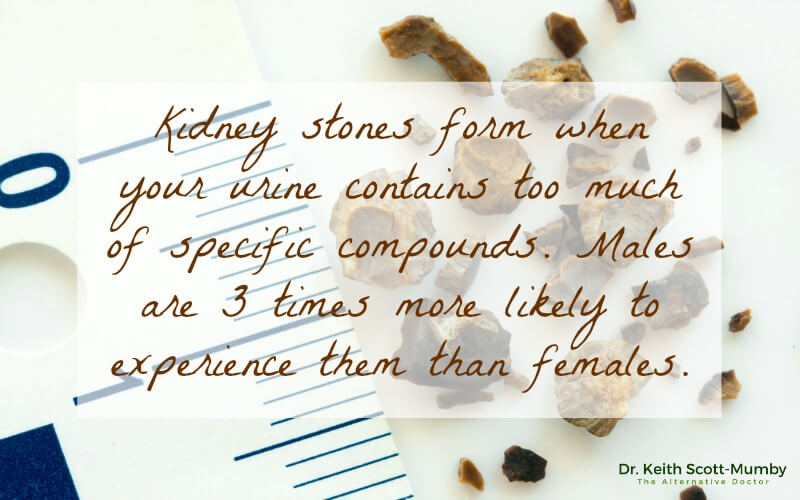I hope that you never, ever get a kidney stone! It’s pain unlike anything you’ve ever felt in your life. We need to talk about how to get rid of kidney stones because if you have one, you’re going to want it out of your body as fast (and effectively) as possible!
6 Crucial Facts about Kidney Stones
- Kidney stones are not rare at all! There’s about 1 million cases of kidney stones in the United States every year. That translates to about 10% of the adult population.
- They’ve been around forever (archeologists found them in Egyptian mummies that were 7,000 years old). Unlike many conditions, this is one that isn’t caused by our modern world.
- If you get a kidney stone, you have a 50% likelihood of getting another one within 10 years (yes, that’s terrible news).
- The biggest risk factor for kidney stones is dehydration.
- They form when your urine contains too much of specific compounds (oxalic acid, uric acid, and cystine) that create small crystalline substances that turn into stones. More on this below!
- These nasty little buggers are more likely to affect you in middle age and there are a couple of rare genetic metabolic disorders (hyperparathyroidism, cystinuria, and hyperoxaluria) that significantly increase your risk!
- Males are 3 times more likely to experience kidney stones as females.
Now, you might not know there are kidney stones brewing in your body until they make it to your ureters – the tubes that empty urine from your kidneys into your bladder. When the stones get there, they block the urine flow. This causes swelling in your kidneys and severe pain.
Pain you can’t understand unless you’ve experienced it (much like labor for women). All you want to know is how to get rid of kidney stones and get back to your life.

Types of Kidney Stones
- Calcium. These are the most common that combine with other substances (like oxalate, phosphate, or carbonate). They most often diagnosed in males between 20-30 years old. They have a high likelihood of returning.
- Cystine. These form in people with cystinuria (an inherited disorder that runs in families and affects both genders).
- Struvite. These usually form in women with urinary tract infection (UTI). They can get fairly big and end up blocking urine flow between the kidney, ureter, or bladder.
- Uric acid. These are also more common in men and usually show up in those who have gout or have gone through chemotherapy.
How to Get Rid of Kidney Stones (Medically)
Very often (thankfully), kidney stones form and flush from your body without you being aware of it. Some are small enough (but still painful) to be flushed with a few natural interventions (outlined below).
Sometimes, there are more complicated situations where a stone won’t pass or is too large to pass. In those instances, you will need (and want) to seek medical help. Some of the methods used in a medical setting are:
- Lithotripsy
- Surgical removal
- Ureteroscopy
- Tunnel surgery
- Extracorporeal shock wave lithotripsy (ESWL)
- Percutaneous lithotripsy
Each of these methods break up the kidney stone into smaller pieces so it can either be flushed through the urinary tract or removed.
How to Get Rid of Kidney Stones (Naturally)
Water. Drink lots and lots of water. If you get a kidney stone, you need to drink as much water as possible in short bursts (not all day long because too much water isn’t good for the rest of your body).
Extreme hydration (32 ounces in a single hour) is your friend to get it to float out of the ureter, help it dissolve, so you can pass it a bit more painlessly.
I won’t lie to you…there’s going to be pain with any kidney stone big enough to block your urinary tubes. Once you pass that stone, you need to get serious with staying hydrated.
72 ounces a day is a good goal and one that will benefit all the cells in your body (a primarily water environment).
A final note on your overall kidney health. Don’t wait until you have extensive kidney damage before you act to protect these critical organs.
Like your liver, you can have widespread cellular damage before you experience a single symptom. You won’t know until it’s almost too late! Kidneys are the “silent” killer.
Your liver and kidneys are two of the most important organs in your body. They help you digest food, flush out toxins, regulate blood pressure and maintain a healthy heart.
But sometimes they need a little extra help to do their jobs properly. To keep them in tip-top health. You need to KNOW what to do and a good chunk of WHY you should do it.
Discover my book “The Waters of Life” for ways to ensure a long life, without pain or anxiety.
